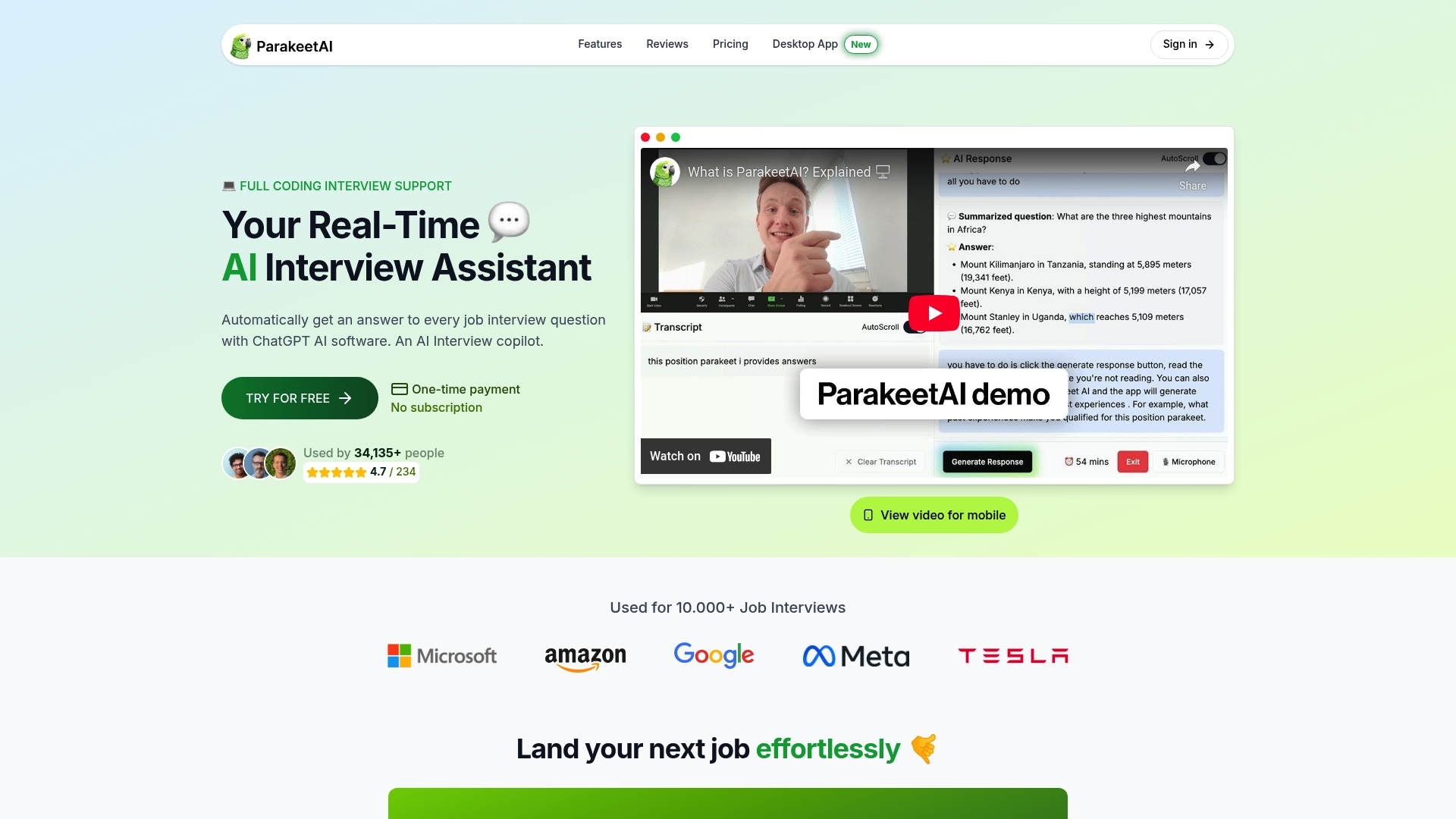7 Best Interview Questions and How to Answer Them Well

Did you know that over 60% of job seekers say tough interview questions are their biggest source of stress? Every answer you give can either open new doors or hold you back. Interviewers use these questions to discover your mindset, ambitions, and how well you fit their team. Understanding how to approach these topics will set you apart and give you the confidence to show your true professional strengths.
Table of Contents
- What Motivates You Most in Your Career?
- How Do You Handle Challenges at Work?
- Describe a Time You Solved a Problem
- Why Are You Interested in This Position?
- Tell Me About Your Strengths and Weaknesses
- How Do You Work in a Team Environment?
- Where Do You See Yourself in Five Years?
Quick Summary
| Takeaway | Explanation |
|---|---|
| 1. Identify Your Career Motivation Type | Understand if you are motivated by achievement, affiliation, or power to express your professional aspirations effectively. |
| 2. Use the STAR Method for Challenges | Structure your responses to workplace challenges with Situation, Task, Action, and Result to showcase problem-solving skills. |
| 3. Strategically Select Your Problem Solving Story | Choose a relevant example that demonstrates your impact, complexity of the issue, and measurable results to highlight your capabilities. |
| 4. Showcase Genuine Interest in the Role | Align your skills with the job and demonstrate your understanding of the company to present yourself as a committed candidate. |
| 5. Balance Ambition and Realism in Career Goals | When discussing future plans, convey a realistic path of progression and alignment with organizational goals to show strategic thinking. |
1. What Motivates You Most in Your Career?
Interviewers love asking about career motivation because it reveals your deeper professional aspirations and potential fit within their organization. Understanding your core motivators can transform how you communicate your professional goals during an interview.
According to David McClelland’s research, professionals are typically driven by three primary motivational factors: achievement, affiliation, and power. Each motivation type reflects a unique approach to professional growth and success.
Achievement motivated professionals are goal oriented. They thrive on challenging projects, measurable outcomes, and personal mastery. During an interview, you might say: “I’m most motivated by opportunities to set ambitious targets and consistently exceed expectations through strategic planning and hard work.”
Affiliation motivated professionals value collaboration and relationships. They find energy in teamwork, mutual support, and creating positive workplace environments. An example response could be: “What motivates me most is building strong team dynamics where we collectively solve complex problems and support each other’s professional development.”
Power motivated professionals seek to influence outcomes and drive organizational change. They are motivated by leadership opportunities and the ability to make significant strategic contributions. A potential interview answer might sound like: “I’m driven by opportunities to lead transformative initiatives and create meaningful impact within an organization.”
When preparing your answer, reflect on which motivation type most authentically represents your professional personality. Be specific, provide concrete examples, and connect your motivational drivers to the specific role you are interviewing for. Remember, authenticity resonates more than a generic response crafted to impress.
2. How Do You Handle Challenges at Work?
Every interviewer wants to understand how you navigate workplace obstacles. Your response reveals your problem solving skills, emotional intelligence, and professional resilience.
According to The Muse, the most effective way to answer this question is using the STAR method. This structured approach helps you communicate your challenge response systematically and professionally.
STAR Method Breakdown:
- Situation: Briefly describe the specific workplace challenge
- Task: Explain your responsibility or role in addressing the challenge
- Action: Detail the precise steps you took to resolve the issue
- Result: Share the positive outcome and what you learned
Crafting a Compelling Response requires strategic storytelling. Choose an example that demonstrates your adaptability, critical thinking, and positive attitude. Avoid scenarios that paint you as confrontational or blame others.
A strong answer might sound like: “In my previous marketing role, we faced a sudden budget reduction that threatened our quarterly campaign. As the lead strategist, I quickly reorganized our resources, negotiated with vendors for better rates, and developed a more cost efficient digital marketing approach. As a result, we not only met our targets but reduced spending by 22%.”
Key tips for your challenge response: focus on solutions not problems, highlight your proactive approach, and demonstrate professional growth. Interviewers want to see that you can transform challenges into opportunities for improvement and innovation.
Remember to practice your response beforehand. Confidence and clarity are just as important as the content of your story.
3. Describe a Time You Solved a Problem
Interviewers ask about problem solving to evaluate your critical thinking, creativity, and ability to navigate complex workplace challenges. Your response provides a window into your professional capabilities beyond what appears on your resume.
According to Wikipedia’s overview of the STAR method, structured storytelling is key to effectively communicating your problem solving skills. This approach transforms a potentially rambling explanation into a compelling narrative that highlights your professional strengths.
Selecting the Right Problem Solving Story requires strategic thinking. Choose an example that demonstrates:
- Complexity: A challenge that wasn’t easily resolved
- Your Direct Impact: Where you played a central role
- Measurable Results: Outcomes that can be quantified
A powerful problem solving story might sound like: “In my previous role as a customer service manager, we were experiencing a 45% increase in unresolved support tickets. I implemented a new triage system that streamlined our workflow, retrained our team on prioritization techniques, and integrated an AI powered routing tool. Within two months, we reduced unresolved tickets by 68% and improved customer satisfaction scores by 37%.”
Key elements to remember: Be specific, focus on your actions, and highlight the positive outcome. Employers want to see that you can analyze situations, develop innovative solutions, and drive meaningful results.
Practice telling your problem solving story with clarity and confidence. The right narrative can transform a standard interview question into a memorable demonstration of your professional capabilities.
4. Why Are You Interested in This Position?
Interviewers want more than a generic response. They are seeking genuine insight into your professional aspirations, understanding of the role, and potential alignment with the company’s mission.
According to Foundit’s career advice, this question is your opportunity to demonstrate why you’re the perfect candidate. Your answer should showcase your most relevant skills and unique potential contributions.
Crafting a Compelling Answer requires strategic preparation. Focus on three key elements:
- Company Knowledge: Demonstrate you understand the organization’s goals
- Role Alignment: Connect your skills directly to job requirements
- Personal Motivation: Explain your genuine professional interest
A powerful response might sound like: “I’m excited about this marketing position because your company is pioneering data driven storytelling. My background in digital analytics and content strategy positions me to contribute immediately. I’m particularly impressed by your recent campaign that blended machine learning with creative messaging, and I’m eager to bring my expertise to help drive similar innovative initiatives.”
Avoid common mistakes like discussing salary, benefits, or making the answer solely about personal gain. Instead, frame your interest as a mutual opportunity for professional growth and organizational impact.
Research the company thoroughly before your interview. Understanding their recent projects, mission, and challenges will help you craft a response that feels authentic and thoughtful. Your goal is to convince the interviewer that you are not just seeking a job but are genuinely passionate about contributing to their specific organizational ecosystem.
5. Tell Me About Your Strengths and Weaknesses
This classic interview question is designed to test your self awareness, honesty, and ability to reflect critically on your professional capabilities. Your response reveals more than just skills it demonstrates emotional intelligence and professional maturity.
Strengths Strategy: Choose strengths directly relevant to the job description. Avoid generic statements like “I work hard” and instead provide specific professional attributes that align with the role’s requirements.
Weakness Approach: The key is to share a genuine area of improvement while simultaneously demonstrating proactive steps to address that weakness. This shows growth mindset and self improvement.
Strengths Example: “My strongest professional attribute is strategic problem solving. In my previous role, I developed data driven solutions that improved team efficiency by 35%. I excel at breaking down complex challenges into actionable steps.”
Weaknesses Example: “I recognize that I sometimes struggle with delegating tasks. Initially, I wanted to manage everything personally. However, I’ve been working on this by implementing clearer team communication protocols and gradually entrusting more responsibilities to capable team members. This has not only improved my leadership skills but also empowered my colleagues.”
Key tips for your response:
- Be honest and authentic
- Connect strengths to job requirements
- Show active improvement for weaknesses
- Use specific professional examples
- Demonstrate self reflection
Remember that interviewers are not looking for perfection. They want to understand your professional self awareness and potential for growth. Approach this question as an opportunity to showcase your maturity and strategic thinking.
6. How Do You Work in a Team Environment?
Teamwork is the cornerstone of professional success. Employers want to understand how you collaborate, communicate, and contribute within a group dynamic.
According to research on behavioral interviewing, working effectively with people from diverse backgrounds is a critical skill. Your response should highlight your interpersonal adaptability and collaborative approach.
Effective Team Collaboration Strategies:
- Active Listening: Truly hear and understand teammates
- Mutual Respect: Value different perspectives and working styles
- Clear Communication: Share ideas constructively
- Flexibility: Adapt to changing team dynamics
A compelling answer might sound like: “In my previous project management role, I worked with a cross functional team representing four different departments. I established weekly collaborative sessions where everyone could share insights. By creating an inclusive environment that welcomed diverse perspectives, we reduced project completion time by 25% and improved overall team satisfaction.”
Key elements to demonstrate:
- Concrete examples of successful teamwork
- Your specific role in team achievements
- How you handle potential interpersonal challenges
- Evidence of emotional intelligence
Avoid generic statements about liking teamwork. Instead, provide specific scenarios that showcase your ability to collaborate effectively, mediate conflicts, and drive collective success. Interviewers want to see that you can be both a strong individual contributor and a supportive team player.
7. Where Do You See Yourself in Five Years?
The classic five year plan question is less about predicting the future and more about demonstrating professional ambition, strategic thinking, and alignment with organizational growth.
According to Foundit’s career advice, this question aims to assess your long term career goals and how they intersect with the company’s strategic objectives.
Crafting a Winning Response requires balancing personal aspiration with professional realism. Your answer should communicate:
- Career Progression: Realistic advancement trajectory
- Skill Development: Continuous learning commitment
- Organizational Alignment: Connection to company vision
A powerful response might sound like: “In five years, I see myself having developed deep expertise in digital marketing strategy. I’m committed to growing within this organization by taking on increasing leadership responsibilities. My goal is to not just contribute individually but to help build more integrated and innovative marketing approaches that drive meaningful business results.”
Common mistakes to avoid:
- Avoid unrealistic expectations
- Do not focus solely on personal gain
- Steer clear of vague statements
- Demonstrate genuine commitment
The interviewer wants to understand your potential trajectory. Show that you are thoughtful about your professional development and see this role as a meaningful step in your career journey. Your response should feel authentic aspirational and strategically grounded.
Below is a comprehensive table summarizing the main topics and strategies discussed throughout the article related to career motivation, handling challenges, and effective interview responses.
| Topic | Description | Key Considerations |
|---|---|---|
| Career Motivation | Based on McClelland’s research, motivations include achievement, affiliation, and power. | Identify and communicate your authentic motivation type during interviews. |
| Handling Challenges | Use the STAR method: Situation, Task, Action, Result. | Focus on solutions, clarity, and measurable outcomes. |
| Problem Solving | Select complex challenges where you had a direct impact. Use structured storytelling. | Highlight measurable results and your specific actions. |
| Interest in Position | Demonstrate company knowledge, role alignment, and personal motivation. | Avoid focus on personal gain; show mutual growth potential. |
| Strengths and Weaknesses | Choose relevant strengths and genuine weaknesses with proactive improvement plans. | Be specific and honest, showing a growth mindset. |
| Teamwork | Key strategies include active listening, mutual respect, and clear communication. | Provide specific, successful collaboration examples. |
| Five-Year Plan | Show career progression, skill development, and alignment with company goals. | Avoid unrealistic expectations; demonstrate commitment to growth. |
Master Your Interview Answers with Real-Time AI Support
Navigating tough interview questions like “What motivates you most” or “Describe a time you solved a problem” can feel overwhelming. You want to show authentic strengths while crafting clear, confident responses that impress. But preparing detailed, specific answers takes time and practice. Imagine having a tool that listens to your interview in real-time and guides you with tailored, professional answers inspired by proven methods like the STAR technique.

Boost your interview confidence instantly with Parakeet AI. This real-time AI job interview assistant helps you articulate thoughtful responses aligned with your motivations, problem-solving skills, and growth mindset. Visit https://parakeet-ai.com now to transform how you prepare and perform in interviews. Don’t leave your success to chance when expert guidance is just a click away.
Frequently Asked Questions
What are the key components of the STAR method for answering interview questions?
The STAR method consists of Situation, Task, Action, and Result. Use this structure to clearly articulate your experiences by detailing the context, your responsibilities, the actions you took, and the positive outcomes achieved.
How can I effectively communicate my strengths in an interview?
Identify strengths that directly align with the job requirements and support them with specific examples. Explain how your strengths can contribute to the role and give measurable outcomes, such as improved team efficiency by 20% in a previous position.
What is the best way to discuss my weaknesses during an interview?
Select a genuine area for improvement and explain the steps you’re taking to address it. For instance, if you struggle with delegating tasks, mention how you’ve started to implement clearer communication protocols to empower your team members, showcasing your commitment to personal growth.
How can I prepare for the question about my long-term career goals?
Create a response that outlines realistic career progression and connects your aspirations with the company’s future. Highlight the skills you wish to develop and how they align with the organization’s objectives, reinforcing your commitment to grow within the role.
What should I focus on when answering questions about teamwork?
Emphasize your interpersonal skills and provide concrete examples of successful collaboration. Discuss specific situations where your contributions led to collective success, illustrating your capability as both an individual contributor and a team player.
How do I tailor my answers to show interest in the specific position I’m applying for?
Research the company and the role thoroughly to understand their mission and challenges. When answering, connect your skills and interests directly to the job requirements and the company’s goals, conveying genuine enthusiasm for contributing to their success.




